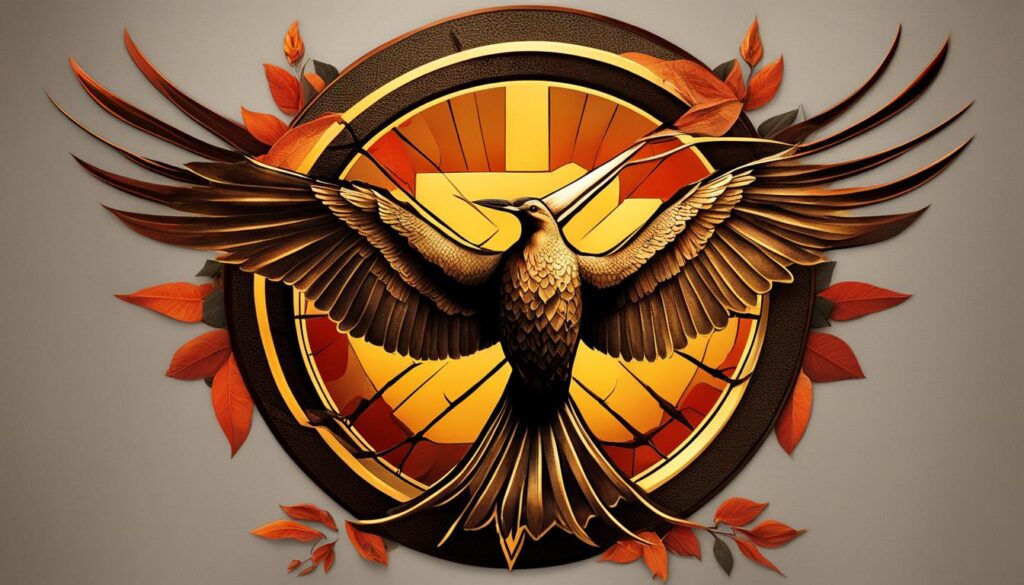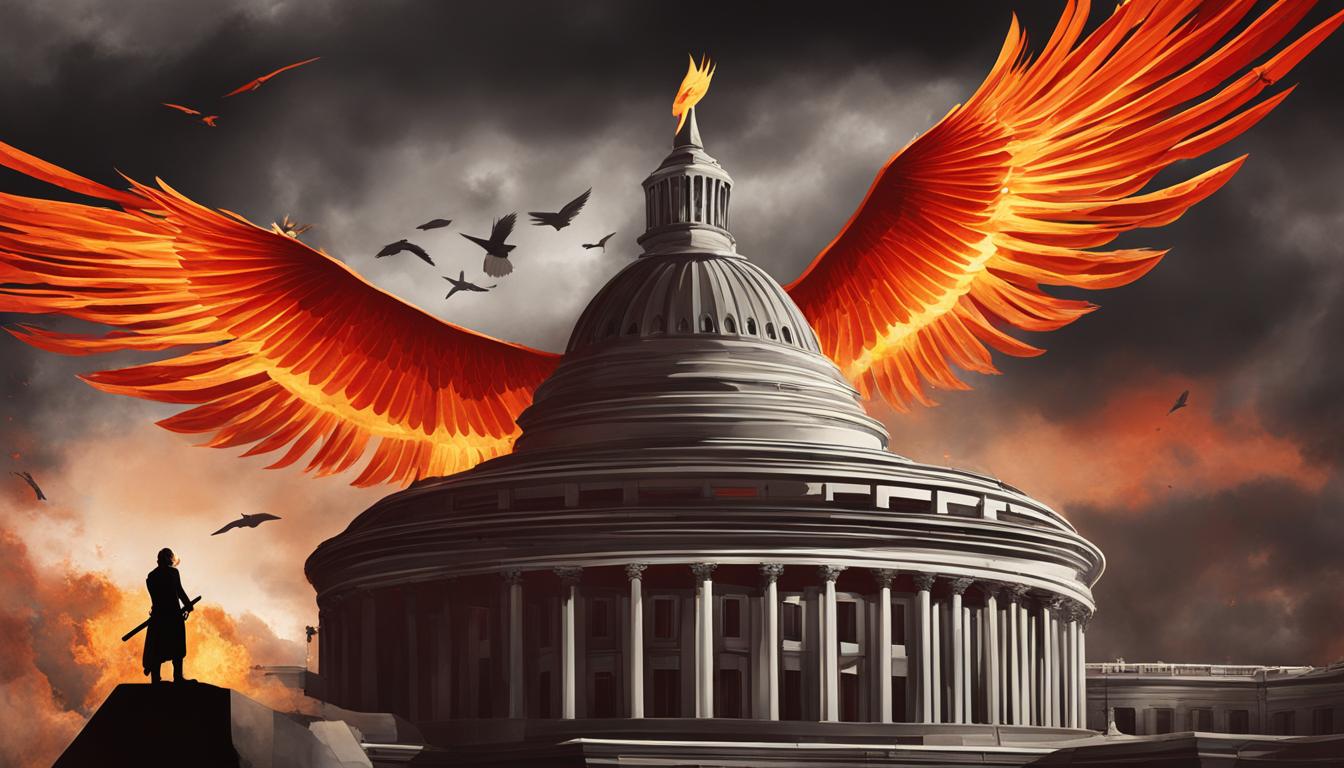“Mockingjay” by Suzanne Collins is the thrilling conclusion to the best-selling Hunger Games trilogy. The book details the final battle between Capitol forces and the rebellion led by Katniss Everdeen
In this audiobook review, we will explore the major plot points, characters, themes, writing style, and the impact of “Mockingjay” on literature and popular culture. We will also assess the effectiveness of the audiobook format and compare it with the print version.
Key Takeaways:
- “Mockingjay” is a riveting conclusion to the Hunger Games series by Suzanne Collins.
- The audiobook format adds a new dimension to the story with its voice actors and pacing.
- “Mockingjay” explores themes such as rebellion, sacrifice, and the impact of war.
- The book’s ending resolves major plot points while leaving room for interpretation and discussion.
- “Mockingjay” has had a significant impact on literature and popular culture since its release.
Plot Summary
“Mockingjay” is the final book in The Hunger Games trilogy by Suzanne Collins. The story picks up from where the previous book, “Catching Fire,” left off. Katniss Everdeen, the protagonist, has been rescued from the Quarter Quell and is now living in District 13 with other refugees from the destroyed District 12.
The plot revolves around a rebellion against the Capitol, which Katniss becomes a vital component of. In exchange for her cooperation with the rebels, the leaders promise to save Peeta, who has been kidnapped by the Capitol.
The war between the Capitol and the rebels intensifies, and Katniss and her team have to go on various missions deep inside the Capitol itself. During these missions, they come across some shocking truths and events that shake their beliefs to the core. Meanwhile, Peeta has been brainwashed by the Capitol and turned into an instrument to fight against the rebellion. Katniss’s ultimate plan is to assassinate President Snow, the mastermind behind the tyranny, and restore freedom to the people of the districts.
The climax of the story takes a turn, and Katniss has to make a critical decision that will decide the outcome of the rebellion. Will she choose revenge, or will she choose mercy? The book ends with an emotional and hopeful note, with all the loose ends tied up and the story coming to a satisfying conclusion.
Characters
One of the strengths of “Mockingjay” by Suzanne Collins is its diverse and complex cast of characters. The main protagonist, Katniss Everdeen, is a multifaceted and relatable character who undergoes significant personal growth throughout the story. Her relationships with Peeta Mellark and Gale Hawthorne are central to the plot, representing different aspects of her personality and values.
The other characters in the book are equally well-developed and add depth to the story. The rebel leaders, including Alma Coin, Plutarch Heavensbee, and Boggs, bring their own motivations and agendas to the table, complicating the already fraught political situation. The members of Squad 451, such as Finnick Odair, Johanna Mason, and Cressida, provide important support and camaraderie to Katniss, while also displaying their own strengths and vulnerabilities.
“…Collins has a gift for creating distinctive and memorable characters who feel like real people, even in the midst of a fantastical setting.”
One of the standout characters in “Mockingjay” is the enigmatic and unpredictable figure of President Snow. His interactions with Katniss lend an air of tension and danger to the story, as she struggles to uncover his true intentions and motives. The other characters in the Capitol, such as Tigris and Effie Trinket, offer glimpses into the luxurious and opulent lifestyle of the elite, in contrast to the harsh realities of the districts.
Overall, the characters in “Mockingjay” are fully realized and compelling, each with their own unique motivations, flaws, and strengths. Their relationships and interactions drive the plot forward and add a layer of emotional depth to the story.
Writing Style
In “Mockingjay,” Suzanne Collins’s writing style remains consistent with the previous books in The Hunger Games series. The prose is straightforward and easy to follow, with a focus on action and dialogue that keeps readers engaged. However, the pacing in “Mockingjay” is notably slower than in the earlier installments, with more emphasis on introspection and character development.
Overall, Collins’s narrative approach in “Mockingjay” effectively conveys the emotional weight of the story, making it a fitting conclusion to the series. The use of present tense throughout the book also helps to immerse readers in the world of Panem and the ongoing rebellion.
“Collins’s writing in ‘Mockingjay’ is a masterful combination of action, emotion, and introspection.”
Themes in “Mockingjay”
The writing style in “Mockingjay” effectively highlights the major themes of the book, including the cost of war, the power of propaganda, and the potential for change. Collins’s prose also emphasizes the importance of sacrifice and perseverance, as the characters struggle to survive in a world torn apart by conflict.
| Themes | Examples from “Mockingjay” |
|---|---|
| The cost of war | The destruction of District 13, the death of Prim, the physical and emotional toll on the characters |
| The power of propaganda | The use of the Mockingjay symbol, the manipulation of public opinion by the Capitol and the rebels |
| The potential for change | The rebuilding of society after the rebellion, the characters’ hopes for a better future |
Themes
In “Mockingjay” by Suzanne Collins, the major themes revolve around the impacts of war, sacrifice, and rebellion against oppressive regimes. The book explores the psychological and emotional toll that war inflicts on individuals and society as a whole, illustrating the cruelty and violence that often accompany conflicts. The themes of sacrifice and rebellion are foundational to the story, showcasing the lengths that individuals and groups will go to obtain freedom and independence.
The impact of war is reflected in the devastating consequences on the characters, their relationships, and their society. For instance, Katniss’ personal struggles with PTSD encapsulate the trauma of war in a very poignant way, while the rebellion’s fight for autonomy contrasts with the autocratic regime’s violence and suppression of freedom.
The themes of sacrifice and rebellion are embodied in the characters’ willingness to make extraordinary sacrifices in the pursuit of liberty. For instance, Katniss volunteered as tribute in the Hunger Games out of love for her sister, and subsequently became the face of a revolution, even though it meant putting herself and her loved ones in danger.

The theme of rebellion encompasses not just Katniss, but other characters such as Peeta Mellark and Gale Hawthorne, who also exhibit a fighting spirit against the Capitol. Together, their actions and sacrifices form the bedrock of the rebellion.
Audiobook Narration
The audiobook version of “Mockingjay” is brought to life by the talented voice actors Carolyn McCormick and Tatiana Maslany. McCormick’s narration captures the emotional depth and complexity of the characters, particularly protagonist Katniss, while Maslany’s portrayal of rebel leader President Coin is equally impressive. The pacing of the narration is excellent, keeping the listener engaged throughout the intense and action-packed scenes. The use of different voices for each character adds to the overall immersive experience of listening to the audiobook.
Overall, the audiobook format is highly effective for “Mockingjay,” enhancing the story’s dramatic tension and highlighting the emotional depth of the characters. The combination of excellent narration and the audiobook format make for a riveting listen that is sure to satisfy both fans of the series and newcomers alike.
Reception and Impact
Upon its release, “Mockingjay” by Suzanne Collins garnered widespread critical and commercial success, cementing its place as a defining work in young adult literature. The book received numerous awards and accolades, including a prestigious nomination for Time Magazine’s “100 Best English-Language Novels from 1923 to 2005.”
The impact of “Mockingjay” extended far beyond the literary community, as the series was adapted into successful film adaptations that grossed over $3 billion worldwide. The final movie in the series, inspired by “Mockingjay,” was released in 2015, solidifying the franchise as a pop culture phenomenon.
Furthermore, the themes in “Mockingjay” resonated with readers and viewers alike, inspiring discussions about revolution, freedom, trauma, and the cost of war. The book’s poignant exploration of these themes made it a powerful work for readers of all ages, and cemented Suzanne Collins as one of the most influential voices in modern young adult literature.
Comparison to Other Books in The Hunger Games Series
When compared to the other books in The Hunger Games series, “Mockingjay” stands out for its darker tone and heightened stakes. While “The Hunger Games” and “Catching Fire” focused on the spectacle and strategy of the titular event, “Mockingjay” shifts the focus to the larger battle for Panem’s future.
One of the notable differences in “Mockingjay” is the increased level of violence and brutality. The book depicts the horrors of war more realistically than its predecessors, with several major character deaths and a general sense of despair throughout the story.
On the other hand, “Mockingjay” also offers a sense of closure and resolution for many of the characters and plot threads. The book brings together many of the themes and storylines introduced in the previous two books and offers a satisfying conclusion to the series.
Overall, “Mockingjay” represents a natural progression for The Hunger Games series, building on the foundation laid by the previous books and pushing the story and characters to new heights. While it may not be the most enjoyable or uplifting book in the series, it is a necessary and fitting end to the story of Katniss Everdeen and her fight for a better future for Panem.
Analysis of the Ending
The final chapters of “Mockingjay” by Suzanne Collins provide a satisfying conclusion to the beloved Hunger Games series. The ending of the book has been a topic of debate among fans, with some feeling that it was too abrupt or unexpected. However, upon deeper analysis, it becomes clear that Collins deliberately crafted the ending to stay true to the themes and messages of the series.
Throughout “Mockingjay,” we see Katniss struggle with the effects of war and trauma, as well as her own complicated feelings about the world around her. The final chapters see her making difficult choices and ultimately finding a measure of peace and closure, albeit with some sacrifices along the way.
The resolution of major plot points, such as the ultimate fate of President Snow and the future of the districts, is handled well and provides satisfying closure without tying up every loose end. The ending serves as a reminder that even in the aftermath of conflict, the effects can linger and the process of healing can take time.
Overall, while some readers may have had differing expectations for the ending of “Mockingjay,” it is clear that the text provides a nuanced and thoughtful conclusion that stays true to the themes of the series.
Conclusion
Overall, the audiobook review of “Mockingjay” by Suzanne Collins was a captivating and emotional experience. The plot kept me engaged from beginning to end, and the characters were well-developed and relatable. The writing style was impressive and effectively conveyed the intensity and gravity of the story.
The themes of rebellion, sacrifice, and the consequences of war were explored in a thought-provoking manner, and the audiobook narration added an extra layer of immersion to the already gripping story.
While the ending may have been divisive among readers, I found it to be a fitting and poignant conclusion to the series. The resolution of major plot points was satisfying, and the impact of the story’s events left a lasting impression on me.
Overall, “Mockingjay” is a must-read for fans of The Hunger Games series, and the audiobook format enhances the experience even further.
FAQ
What is "Mockingjay" by Suzanne Collins?
“Mockingjay” is the final book in The Hunger Games series written by Suzanne Collins. It serves as the conclusion to the gripping dystopian story following the adventures of protagonist Katniss Everdeen.
What is the plot summary of "Mockingjay"?
In “Mockingjay,” Katniss finds herself at the center of the rebellion against the Capitol. With the war escalating, she must navigate the dangers of being the symbol of hope while facing personal challenges and making tough choices that will determine the fate of Panem.
Who are the key characters in "Mockingjay"?
The main characters in “Mockingjay” include Katniss Everdeen, Peeta Mellark, Gale Hawthorne, President Snow, and a host of other allies and enemies. Each character plays a vital role in the story’s development, showcasing resilience, loyalty, and the complexities of human nature.
How would you describe Suzanne Collins’ writing style in "Mockingjay"?
Suzanne Collins’ writing style in “Mockingjay” is fast-paced and engaging. She uses vivid descriptions and powerful imagery to immerse readers in the dystopian world, effectively conveying the intensity of the characters’ emotions and the high-stakes nature of the story.
What are the major themes explored in "Mockingjay"?
“Mockingjay” delves into themes of rebellion, sacrifice, the consequences of war, and the corruptive nature of power. It raises thought-provoking questions about morality and the lengths individuals will go to fight for what they believe in.
How is the audiobook narration for "Mockingjay"?
The audiobook narration for “Mockingjay” is masterfully done, with talented voice actors bringing the characters to life. The pacing and delivery effectively capture the tension and emotions of the story, making it a captivating listening experience.
How was "Mockingjay" received by readers and critics?
“Mockingjay” received mixed reviews from readers and critics. While some appreciated the intense and thought-provoking conclusion, others felt the story was too dark and found certain aspects unsatisfying. It remains a controversial and polarizing installment in The Hunger Games series.
How does "Mockingjay" compare to the other books in The Hunger Games series?
“Mockingjay” differs from the previous books in The Hunger Games series as it focuses more on the consequences of war and the aftermath of the rebellion. While it shares the same dystopian setting and recurring characters, it offers a darker and more mature exploration of the story’s themes.
What can you tell me about the ending of "Mockingjay"?
The ending of “Mockingjay” ties up major plot points, offering resolution for the characters and their story arcs. It explores the costs of war and the price of freedom, leaving readers with a bittersweet and thought-provoking conclusion.
What is the overall verdict for the audiobook review of "Mockingjay"?
In conclusion, the audiobook review of “Mockingjay” acknowledges the intense and compelling nature of Suzanne Collins’ finale to The Hunger Games series. While it may divide readers with its dark themes and complex characters, it remains a must-read for fans of dystopian literature.



